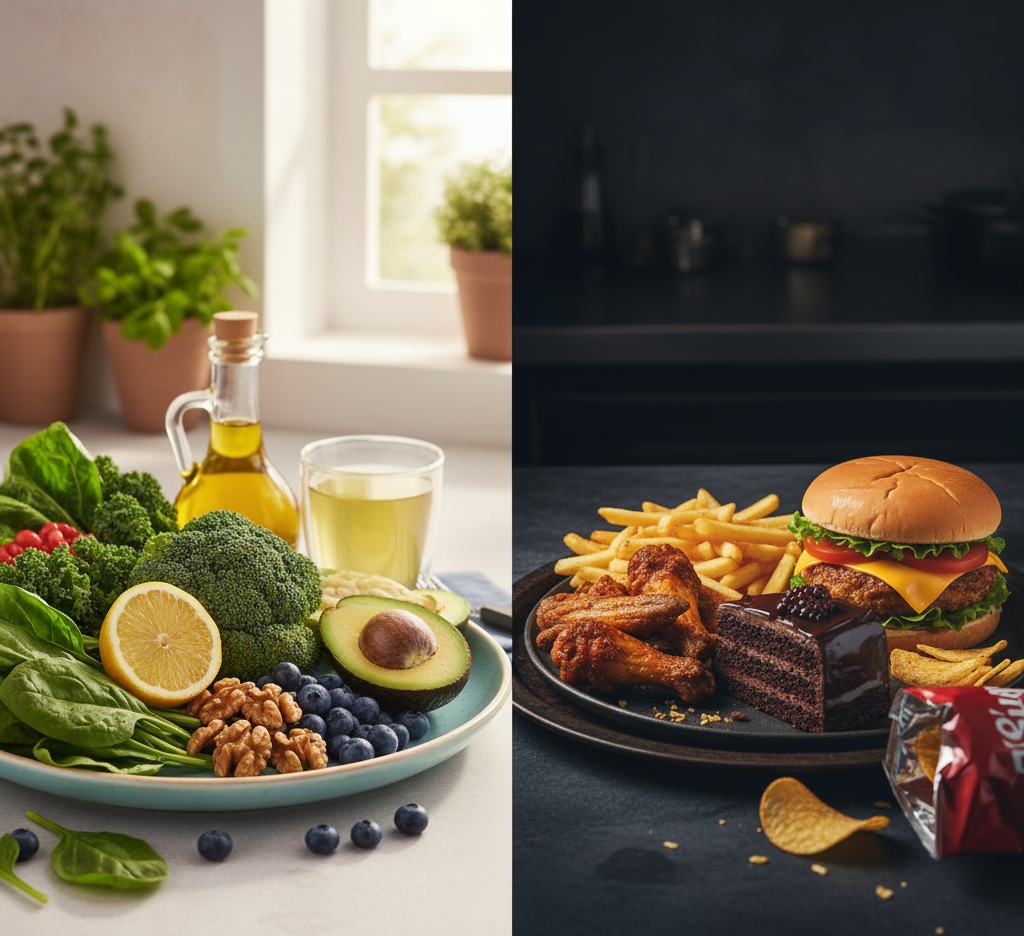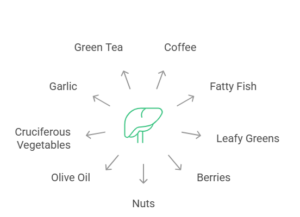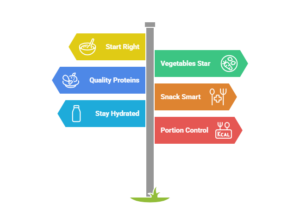
Your liver is one of the hardest-working organs in your body, performing over 500 vital functions every single day. From filtering toxins out of your bloodstream to producing bile for digestion, metabolizing nutrients, and storing essential vitamins, your liver deserves some serious attention when it comes to your dietary choices.
The good news? What you eat can have a profound impact on your liver’s health and function. Making informed food choices can help protect this remarkable organ, support its natural detoxification processes, and even reverse early-stage liver damage. Let’s explore the foods that help your liver thrive and those that can compromise its function.
Understanding Your Liver’s Role
Before diving into specific foods, it’s important to understand why liver health matters so much. Your liver processes everything you eat and drink, converting nutrients into forms your body can use and neutralizing harmful substances. It also produces proteins necessary for blood clotting, stores glucose for energy, and helps regulate cholesterol levels.
When your liver becomes overburdened by poor dietary choices, alcohol, or certain medications, it can develop inflammation, accumulate fat, or even progress to more serious conditions like cirrhosis. Fortunately, the liver has an impressive ability to regenerate and heal itself when given the right support.
Foods That Support Liver Health

Coffee: Your Liver’s Unexpected Ally
Research has consistently shown that coffee drinkers have a lower risk of liver disease, including cirrhosis and liver cancer. Coffee appears to protect against fat accumulation in the liver and may reduce inflammation. The beneficial compounds in coffee, including caffeine and antioxidants, help prevent the buildup of collagen that leads to liver scarring. Even if you already have liver disease, moderate coffee consumption (around 2-3 cups daily) may slow its progression.
Fatty Fish: Omega-3 Powerhouses
Salmon, mackerel, sardines, and other fatty fish are rich in omega-3 fatty acids, which help reduce liver inflammation and prevent fat buildup. These healthy fats may also improve insulin sensitivity, which is particularly beneficial for people with non-alcoholic fatty liver disease. Aim to include fatty fish in your diet at least twice a week. If you’re not a fish fan, fish oil supplements or plant-based omega-3 sources like flaxseeds and walnuts can provide similar benefits.
Leafy Greens: Nature’s Detoxifiers
Spinach, kale, arugula, and other leafy greens contain high levels of chlorophyll, which helps neutralize heavy metals and chemicals in the bloodstream, taking some burden off the liver. These vegetables are also rich in fiber, which aids digestion and helps the liver process nutrients more efficiently. The antioxidants in leafy greens combat oxidative stress, protecting liver cells from damage.
Berries: Antioxidant Champions
Blueberries, cranberries, and other berries are packed with antioxidants called polyphenols, which protect the liver from damage. Studies suggest that cranberries may help prevent urinary tract infections by stopping bacteria from adhering to the bladder wall, but they also contain compounds that protect liver cells. Blueberries have been shown to boost immune cell response and contain antioxidants that may slow the development of lesions and fibrosis in the liver.
Nuts: Vitamin E for Liver Protection
Almonds, walnuts, and other nuts are excellent sources of vitamin E, a powerful antioxidant that protects liver cells from oxidative damage. Research indicates that vitamin E may be particularly beneficial for people with non-alcoholic fatty liver disease. Nuts also provide healthy fats and fiber, both of which support overall liver function. A small handful of nuts daily can contribute to better liver health without adding excessive calories.
Olive Oil: Healthy Fat That Heals
Extra virgin olive oil is rich in monounsaturated fats and antioxidants that reduce liver inflammation and improve insulin sensitivity. Studies show that regular consumption of olive oil is associated with lower levels of liver enzymes, indicating better liver function. Use it as your primary cooking oil and drizzle it over salads for maximum benefit.
Cruciferous Vegetables: Enzyme Boosters
Broccoli, cauliflower, Brussels sprouts, and cabbage contain compounds that support the liver’s natural detoxification enzymes. These vegetables help the liver convert toxins into less harmful substances that can be more easily eliminated from the body. They’re also high in fiber and nutrients that support overall digestive health.
Garlic: More Than Flavor
Garlic contains sulfur compounds that activate liver enzymes responsible for flushing out toxins. It also contains allicin and selenium, nutrients that support liver cleansing and protect against oxidative damage. Adding fresh garlic to your cooking is an easy way to boost liver health while enhancing flavor.
Green Tea: Antioxidant-Rich Beverage
Green tea is loaded with catechins, plant antioxidants that may improve liver function and reduce fat storage in the liver. Regular consumption of green tea has been associated with a reduced risk of liver cancer and may help protect against various liver diseases. Aim for 2-3 cups daily for optimal benefits.
Foods to Limit or Avoid
Alcohol: The Liver’s Primary Enemy
Excessive alcohol consumption is one of the leading causes of liver disease worldwide. When you drink, your liver prioritizes metabolizing alcohol over its other functions, and the byproducts of alcohol metabolism can damage liver cells, leading to inflammation, fatty liver, and eventually cirrhosis. If you already have liver disease, avoiding alcohol entirely is crucial. Even for healthy individuals, moderation is key—no more than one drink per day for women and two for men.
Sugar and High-Fructose Corn Syrup
Excess sugar, particularly fructose, is converted into fat in the liver, contributing to non-alcoholic fatty liver disease. High-fructose corn syrup, found in many processed foods and sodas, is especially problematic because it’s metabolized primarily by the liver. This can lead to fat accumulation, inflammation, and insulin resistance. Limiting added sugars and avoiding sweetened beverages is one of the most important steps you can take for liver health.
Refined Carbohydrates
White bread, white rice, pastries, and other refined carbohydrates spike blood sugar levels, leading to increased insulin production and fat storage in the liver. These foods lack the fiber and nutrients found in whole grains, making them less satisfying and more likely to contribute to overeating. Choose whole grain alternatives like brown rice, quinoa, and whole wheat bread instead.
Trans Fats and Saturated Fats
Trans fats, found in many processed and fried foods, increase inflammation throughout the body, including in the liver. They also contribute to the buildup of fat in liver cells. Check food labels for “partially hydrogenated oils” and avoid products containing them. While some saturated fat is acceptable in moderation, excessive consumption from red meat, butter, and full-fat dairy products can contribute to fatty liver disease.
Processed and Packaged Foods
Many processed foods contain high levels of sodium, unhealthy fats, added sugars, and preservatives that place extra burden on the liver. The liver must work harder to process these artificial ingredients and chemical additives. Focus on whole, unprocessed foods whenever possible to give your liver a break.
Excessive Salt
High sodium intake can lead to fluid retention and may worsen liver function in people with advanced liver disease. Processed foods are often loaded with hidden sodium, so cooking fresh meals at home allows you to control your salt intake better. Use herbs and spices for flavor instead of relying on salt.
Creating a Liver-Friendly Eating Plan

Supporting your liver doesn’t require a restrictive or complicated diet. Here are some practical strategies to incorporate liver-healthy foods into your daily routine:
Start your day right: Have a breakfast that includes protein, whole grains, and fruit. Try oatmeal with berries and walnuts, or eggs with spinach and whole grain toast.
Make vegetables the star: Fill half your plate with vegetables at lunch and dinner. Include a variety of colors to maximize nutrient intake.
Choose quality proteins: Include fatty fish twice a week, and opt for lean proteins like chicken, turkey, or plant-based options on other days.
Snack smart: Keep nuts, fresh fruit, or cut vegetables on hand for healthy snacking options.
Stay hydrated: Drink plenty of water throughout the day to support your liver’s detoxification processes.
Practice portion control: Even healthy foods can contribute to weight gain if eaten in excess, and maintaining a healthy weight is crucial for liver health.
The Bottom Line
Your liver is remarkably resilient and responsive to dietary changes. By incorporating liver-friendly foods like coffee, fatty fish, leafy greens, and berries while limiting alcohol, sugar, and processed foods, you can significantly improve your liver function and overall health. Remember that consistency matters more than perfection—small, sustainable changes to your eating habits can make a big difference over time.
Take Control of Your Liver Health Today
Your liver health is fundamental to your overall wellbeing, and the right dietary choices can make a significant difference. However, everyone’s health situation is unique, and what works for one person may not be ideal for another.
Dr. Preetha at Gastro-Doc is committed to helping patients achieve optimal digestive and liver health through personalized care and evidence-based treatment. If you’re experiencing symptoms such as persistent fatigue, unexplained weight changes, abdominal discomfort, or have concerns about your liver function, don’t wait to seek professional guidance.
Whether you need help managing an existing liver condition, want to prevent liver disease, or simply wish to optimize your digestive health through proper nutrition, our team is here to support you every step of the way.
Contact Dr. Preetha today to schedule your consultation and take the first step toward better liver health.
Frequently Asked Questions
Q: How quickly can dietary changes improve liver health?
A: Many people notice improvements in liver enzyme levels within just a few weeks of making dietary changes. However, more significant improvements, such as reducing liver fat in cases of fatty liver disease, typically take several months of consistent healthy eating combined with regular exercise.
Q: Can I reverse fatty liver disease through diet alone?
A: Yes, in many cases, non-alcoholic fatty liver disease can be reversed through dietary changes and weight loss. Losing just 10% of your body weight can significantly reduce liver fat and inflammation. However, the approach should be gradual and sustainable, aiming for 0.5-1 kg of weight loss per week.
Q: Are liver detox diets and cleanses effective?
A: Your liver is naturally designed to detoxify your body, and there’s no scientific evidence that special detox diets or cleanses improve liver function. Instead of short-term cleanses, focus on maintaining a consistently healthy diet that supports your liver’s natural detoxification processes.
Q: How much coffee is safe for liver health?
A: Research suggests that 2-3 cups of coffee per day may provide liver protective benefits. However, individual tolerance varies, and excessive caffeine can cause other health issues. If you’re sensitive to caffeine, even 1-2 cups may be beneficial. Always consume coffee without excessive sugar or cream.
Q: Should I take supplements for liver health?
A: While certain supplements like vitamin E, milk thistle, or omega-3 fatty acids may benefit some people with liver conditions, it’s important to consult with a healthcare provider before starting any supplements. Some supplements can actually harm the liver, especially when taken in high doses or combined with certain medications.
Q: Is it safe to eat liver (the organ meat) for liver health?
A: Liver from animals is nutritious and rich in vitamins, particularly vitamin A and B vitamins. However, it should be consumed in moderation (once a week at most) as it’s high in cholesterol and vitamin A, which can be toxic in large amounts. It’s not necessary for liver health and should be avoided during pregnancy.
Q: Can I drink alcohol if I have fatty liver disease?
A: If you’ve been diagnosed with any form of liver disease, including fatty liver, it’s best to avoid alcohol completely. Even moderate alcohol consumption can worsen liver damage and interfere with the liver’s ability to heal.
